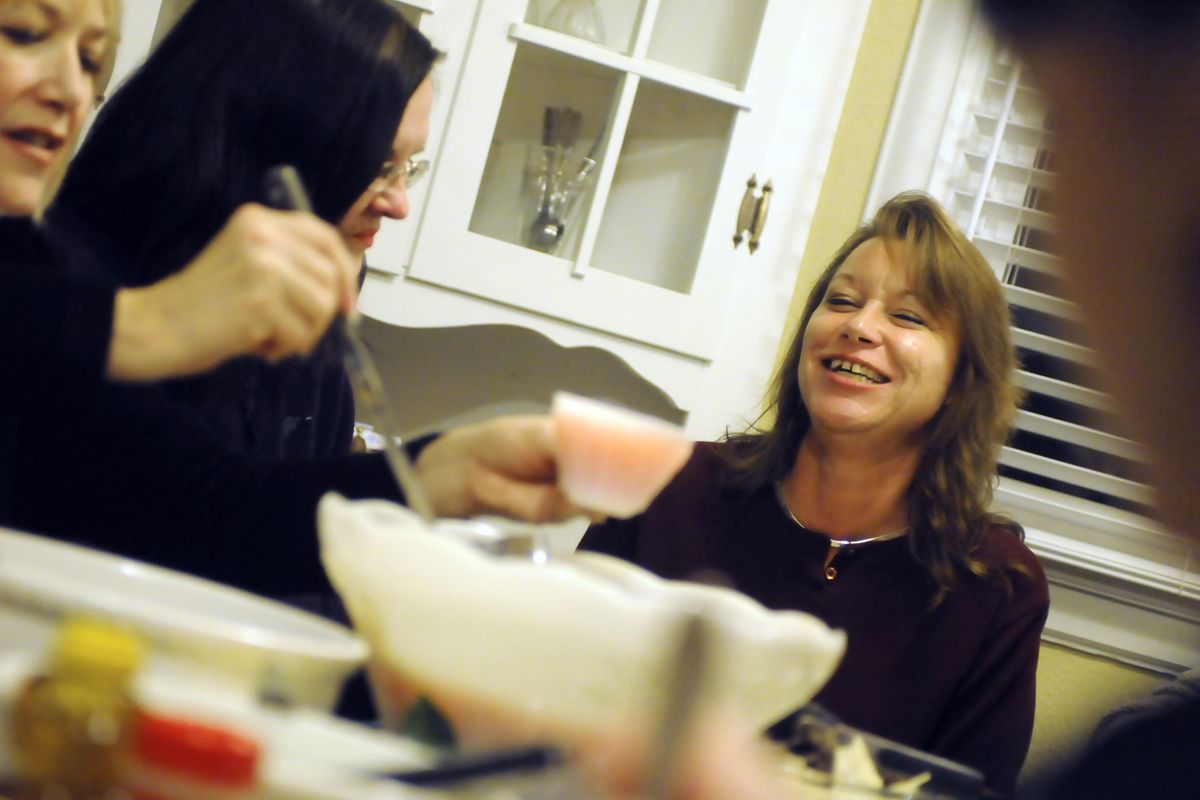Mealtime at Miryam’s
Women in transition from prison, addiction, abuse discover importance of dining-table rituals

When you are a drug user and alcoholic, as Kitty Coleman was for 27 of her 41 years, you hang out in dark places that smell of unwashed people, and the food is junk – convenience store burritos, macaroni flavored with mayonnaise.
Contrast this to Miryam’s House on Spokane’s lower South Hill, where Coleman has lived since April, working daily on her continued sobriety amid other women in transition.
Here, the kitchen comes alive every afternoon – light, warm and filled with the aroma of good cooking.
At 6 p.m., the 10 women who live at Miryam’s eat together. It’s a healing ritual, in a healing place.
On this Sunday before Thanksgiving, those of you in charge of your family’s holiday meal might feel overwhelmed. But take heart: The Thanksgiving Day meals you prepare nourish not just the body, but the emotional well-being of everyone gathered around the table, especially the children. Same goes with regular evening meals together.
“Every night, there is someone who cares,” explains Diane Critchlow, the program director at Miryam’s. “It’s so primal.”
•••
Critchlow grew up in Spokane, the fifth of six kids.
“When my dad got home from work, we’d all sit down to dinner and talk and laugh,” she says.
Around those dinner tables, Critchlow listened to her siblings tell stories from the day. She shared her own stories. She learned table manners – pass the salt and pepper, please.
“On Thanksgiving, we’d dress up, have the fire going,” she says. “It always smelled so good. And I remember when I finally got to sit at the big-people table.”
For children, regular family dinners set the table with future advantages. Studies show that children raised with family mealtimes do better in school, and, as young adults, they make better impressions at job interviews conducted over breakfast, lunch or dinner, because they know where a napkin belongs and what to do with all those forks.
But in some homes, as Critchlow points out, “People are yelling ‘Sit down in front of the TV and eat your hamburger!’ instead of sitting around the table and being asked, ‘Tell me what you learned today.’
“To have a family teach you, that’s what we all need. But when people don’t get that, it’s never too late. There’s a place like Miryam’s where you can get what you didn’t when you were little kids.”
•••
Kitty Coleman’s parents divorced when she was 12.
“Before Dad went, we had family meals,” she remembers. “After Dad left, it was fend for yourselves, because mom was working.”
Coleman ran away at 15. Her addictions grew more important than eating right.
Later, when she had three children, she tried preparing regular meals for them, but “mealtimes were chaotic because I drank a lot,” Coleman says.
Women stay at Miryam’s for 10 months to a year. They arrive there for many reasons, but all include brokenness of some kind – addiction, abuse, mental illness, release from incarceration.
To recover requires structure. The 6 p.m. dinner, Monday through Friday, is mandatory. And the women take turns cooking.
Coleman remembers the first meal she cooked at Miryam’s: “We had gourmet hamburgers. I was nervous, but I’m a gotta-do-everything perfect person, so we had hamburgers with ham and bacon and cheddar cheese and avocados and onions.”
After the meal was over, she felt relieved.
“They loved my cooking,” she says.
Trudy Ophus, 54, lived at Miryam’s in 2008 and now volunteers there. She eats meals there once a week; alums are always welcome at the table.
“Just having a hot, warm meal is nice,” she says. “When you are out on your own, you don’t cook a lot for yourself.”
One recent Monday, promptly at 6 p.m., the women gathered around the table. They bowed their heads as grace was recited.
The women placed napkins on their laps. They patiently passed plates of ground beef, cheddar cheese, tomatoes, sour cream, beans and salsa. They waited until everyone had a plateful of food before they began eating.
They talked together of the day’s highs and lows. They talked about what they like best about the evening meals.
Marci Tompkins choked back tears while saying this: “I was homeless basically for a year. I lived in cheap motels. I stayed with friends. I stayed at crisis shelters. No kitchen, no community meals.
“I’m not a fancy cook, but I do enjoy it. I didn’t realize how much I missed it until I came here.”
The first meal she cooked at Miryam’s? “I made meatloaf and baked potatoes. Everyone survived.”
By 6:40, the meal was winding down. The women asked permission to be excused. They carted their empty plates to the sink. Several helped clean up. Within 15 minutes, the kitchen was in perfect order.
Coleman often tells newcomers about the healing that happens around this grown-ups table.
“Finally,” she says, “I’m someplace where I’m supposed to be.”